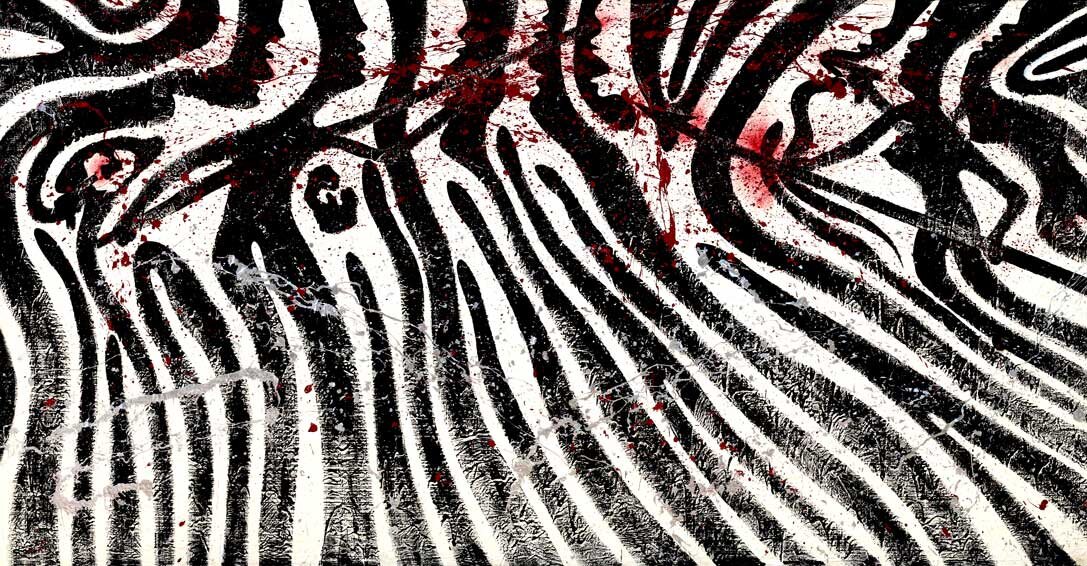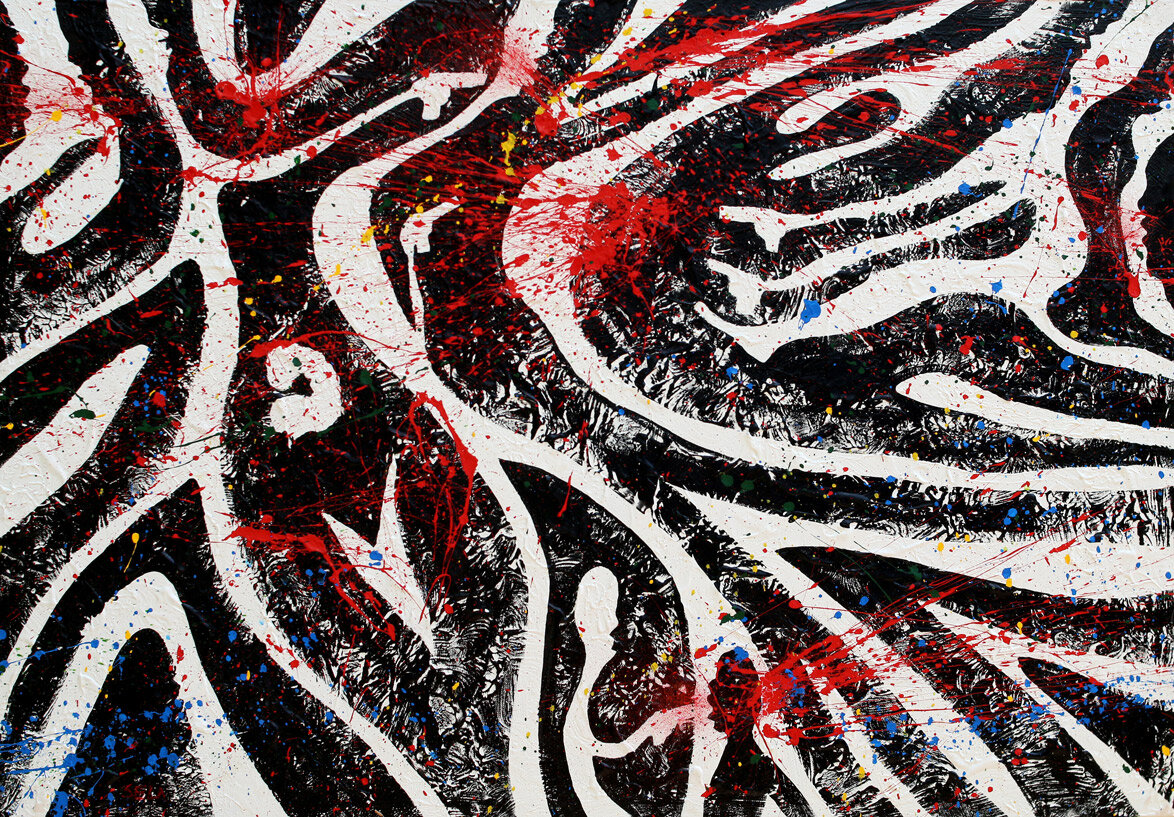
“hunter hunted series”
Over the last few years Human Rights Organizations, street protests, mobilizations and demands for racial justice have increasingly drawn public attention to incidents of neo-slavery, open racism and mistreatment of Af- ricans all over the world — From violent police shootings of Africans in America, underground “slave auctions” in North Africa (now open “slave auctions” on social media apps), racial discrimination against the African population in Papua New Guinea, xenophobic murders in South Africa and the “neo-colonial tactics” of Chinese land grab in Ghana for illicit small-scale mining. All these unfortunate events have, in one stroke, incensed and moved creatives to push beyond boundaries of the ordinary to freely express their political art statements through what Fanon terms collective catharsis. In Black Skin, White Masks, Fanon (1952) reminds us that in every society, exists – must exist – a channel, an outlet through which the forces accumulated in the forms of aggression can be released'. Powerful art is one of the channels through which the force of accumulated aggression can be freely released. In this exhibition Efo Sela’s paintings travels back in time to capture oppression and resistance to reexamine the fractured relationship between Africans on the continent and Africans in the Diaspora. For Efo Sela, ancestral blood ties and inequality acts as a driving force to initiate critical dialogues in his ongoing “Hunter Hunted Series” of paintings, a body of work which focuses on the fight against oppression. Efo Sela’s paintings highlights ancestral bond and the unifying force that flows through the blood of African people both on the continent and in the Diaspora. His works explores race, black power and the struggle against our common enemy – racial oppression and white terror domination. The mass lynching of Africans, slave raids, mind-numbing tortures, assassination of black nationalists, the middle passage and colonization did not totally “disappear”. They’re constantly reemerging in disguised forms and the persistent mass amnesia clogging the minds of Africans obscures this fact.
Efo Sela’s paintings carefully draws our attention to these critical issues. The goal here is to develop a keen retrospective eye to peek deep into our past as “racially oppressed people”, but have we always been an oppressed race? What we seem to constantly forget and discuss is the fact that throughout our revolutionary struggles against imperialism, colonial- ism and racially motivated brutalities, Africans fought, rebelled, resisted and eventually triumphed. There is a tall list to attest to the victories against colonial oppressors—Nsamanko, Saghrenti, Dogba, Adwa, Isandlwana, Hannibal’s Punic victories, Bois Caiman just to mention a few. Through his paintings, Efo Sela ''wants us to apply the Sankofa principle, he wants us to collectively remember, return and learn from our glorious past triumphs and mistakes, he doesn't want us to forget''. Art becomes a powerful medium for deep introspection and reflection.
'When we revolt it's not for a particular culture. We revolt simply because, for many reasons, we can no longer breathe' - FRANZ FANON
The Murder of George Junius Stinney Junior
Acrylic on Canvas
85 cm x 70 cm
[SOLD]
Fools Gold
Acrylic on canvas
On Hold
120 cm x 120 cm
Untitled I
Acrylic on canvas
120 cm x 1240 cm
[SOLD]
Yen Ara Y’asaase Ni
Acrylic on Canvas
135cm X 260 cm
Price on Request
Adwa
Acrylic on canvas
130cm x 190cm
Price on Request
Asrafo Hannibal
Acrylic on canvas
130cm x 190 cm
Chaos Theory
Acrylic on Canvas
175 cm x 110 cm
[SOLD]
Heeding Dutty Boukman’s Advice
Acrylic on canvas
130cm x 170cm
Zebra Murders
Acrylic on canvas
100 cm x 90 cm
Sold
Rethinking Cetchwayo’s Strategies
Acrylic on canvas
195 cm x 130 cm
Price on Request
Nsamanko
Acrylic on Canvas
130cm x 193cm
Price on Request
The Battle of Dogba
Acrylic on canvas
196cm x 110cm
Price on Request
The Nzhinga Principle
Acrylic on canvas
150cm x 150cm
Sold
Emotional Coldness and Loss
Sold
Back Breakers
Acrylic on Canvas
85 cm x 70 cm
Sold
Untitled II
Acrylic on Canvas,
58.5 cm x 37cm
Sold
Guateng
Acrylic on Canvas
130m x 52 cm
Sold
Untitled I
Acrylic on Canvas
65.5 cm x 40.5 cm
Sold

![The Murder of George Junius Stinney Junior
Acrylic on Canvas
85 cm x 70 cm
[SOLD]](https://images.squarespace-cdn.com/content/v1/5fbd07e37a2a393af9d5d3da/1608645806799-O93COM10OFP1NS9TONYQ/1.-Efo-Sela-Adjei----The-Murder-of-George-Junius-Stinney-Junior-%28Acrylic-on-canvas-85cm-x-70-cm%29.jpg)

![Untitled I
Acrylic on canvas
120 cm x 1240 cm
[SOLD]](https://images.squarespace-cdn.com/content/v1/5fbd07e37a2a393af9d5d3da/1608645822215-HA0AVVZVJ68EPOAC30R7/1.-Efo-Sela-Adjei---Fools-Gold-II-%28Acrylic-on-canvas-120-cm-x-140-cm%29.jpg)



![Chaos Theory
Acrylic on Canvas
175 cm x 110 cm
[SOLD]](https://images.squarespace-cdn.com/content/v1/5fbd07e37a2a393af9d5d3da/1608645899663-EEHOMZK1OTM60HBERIHG/1.-Efo-Sela-Adjei---Chaos-Theory-%28Acrylic-on-Canvas-175-cm-x-110-cm%29.jpg)










